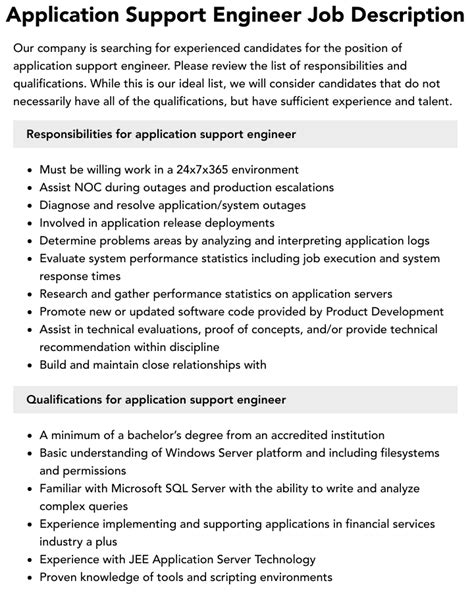The role of an Application Support Engineer is crucial in ensuring the smooth operation of software applications within an organization. These professionals are responsible for providing technical support and resolving issues related to software applications, thereby ensuring minimal downtime and optimal system performance.
In today's technology-driven world, companies rely heavily on software applications to manage their day-to-day operations. However, these applications can sometimes malfunction or encounter errors, leading to significant disruptions in business operations. This is where the expertise of an Application Support Engineer comes into play.
Key Responsibilities of an Application Support Engineer
An Application Support Engineer's primary responsibility is to provide technical support for software applications. Some of the key responsibilities of an Application Support Engineer include:
Technical Support

- Responding to technical queries and issues raised by end-users
- Troubleshooting and resolving software application-related issues
- Providing timely and effective solutions to technical problems
- Collaborating with cross-functional teams to resolve complex technical issues
Application Maintenance

- Conducting regular maintenance tasks to ensure optimal application performance
- Performing software updates, patches, and upgrades
- Monitoring application performance and identifying areas for improvement
- Developing and implementing processes to improve application reliability and stability
Communication and Collaboration

- Communicating technical information to non-technical stakeholders
- Collaborating with development teams to resolve technical issues
- Providing training and support to end-users on software applications
- Developing and maintaining technical documentation
Problem-Solving and Analytical Skills

- Analyzing complex technical problems and developing effective solutions
- Identifying root causes of technical issues and implementing corrective actions
- Developing and maintaining technical expertise in specific software applications
- Staying up-to-date with industry trends and emerging technologies
Skills and Qualifications
To be successful as an Application Support Engineer, one should possess the following skills and qualifications:
- Bachelor's degree in Computer Science, Information Technology, or a related field
- Strong technical skills in software applications, operating systems, and hardware
- Excellent problem-solving and analytical skills
- Effective communication and collaboration skills
- Ability to work in a fast-paced environment and prioritize tasks effectively
- Strong attention to detail and ability to maintain accurate records
Career Path and Growth Opportunities
The role of an Application Support Engineer is a critical one, and individuals in this role can expect a challenging and rewarding career path. With experience and expertise, Application Support Engineers can move into senior roles, such as:
- Senior Application Support Engineer
- Team Lead or Manager
- Technical Architect
- Solutions Consultant
In addition, Application Support Engineers can also transition into related roles, such as:
- Software Developer
- Quality Assurance Engineer
- Technical Writer
- IT Project Manager
Gallery of Application Support Engineer






FAQs
What is the primary responsibility of an Application Support Engineer?
+The primary responsibility of an Application Support Engineer is to provide technical support for software applications, ensuring minimal downtime and optimal system performance.
What skills and qualifications are required to be an Application Support Engineer?
+To be an Application Support Engineer, one should possess strong technical skills in software applications, operating systems, and hardware, as well as excellent problem-solving and analytical skills. A Bachelor's degree in Computer Science, Information Technology, or a related field is also required.
What career path and growth opportunities are available to Application Support Engineers?
+Application Support Engineers can move into senior roles, such as Senior Application Support Engineer, Team Lead or Manager, Technical Architect, or Solutions Consultant. They can also transition into related roles, such as Software Developer, Quality Assurance Engineer, Technical Writer, or IT Project Manager.
In conclusion, the role of an Application Support Engineer is a critical one, requiring a unique blend of technical, analytical, and communication skills. With the right skills and qualifications, individuals in this role can expect a challenging and rewarding career path, with opportunities for growth and advancement.
